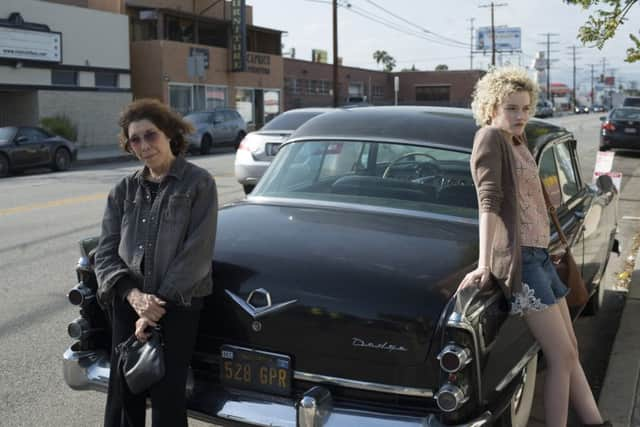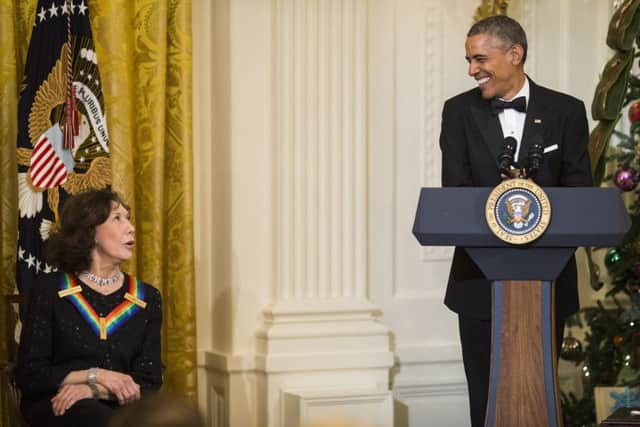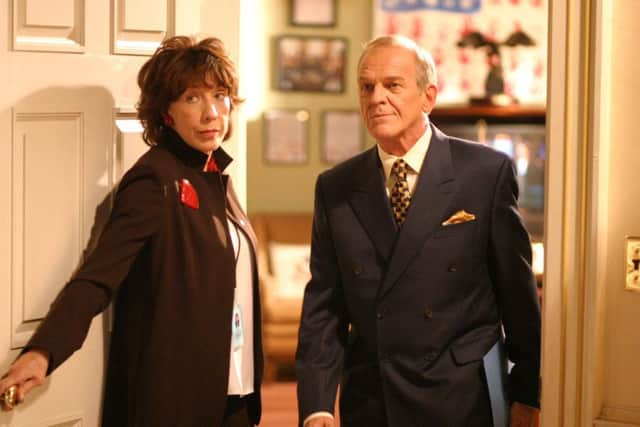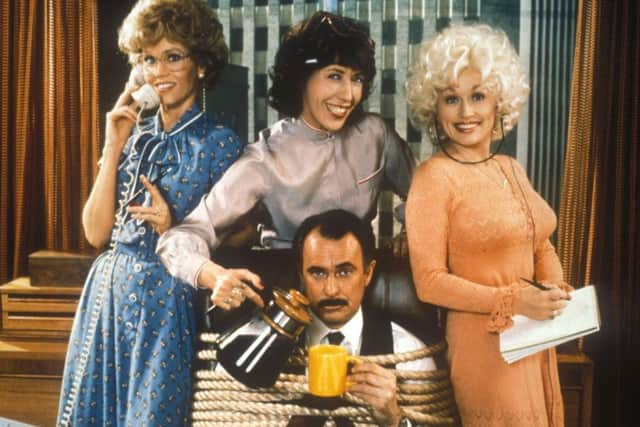Interview: Lily Tomlin defies convention, again, on Grandma


‘IT’S been kind of amazing,” says Lily Tomlin. The actress and comedian is referring to the career renaissance she’s been enjoying over the past 12 months. Though she’s never really been away – not since breaking through in sketch comedy on American television in the early 1970s and as a movie star with her Oscar-nominated performance in Robert Altman’s Nashville 40 years ago – at 76 she’s now doing some of her best work in projects with typically progressive views on ageing, gender and sexuality.
For starters there’s the Netflix sitcom Grace And Frankie, which reunites her with Jane Fonda for the first time since the 1980 feminist blockbuster 9 To 5. They play a pair of married women reluctantly forced to rely on each other for support when their business-partner husbands (played by Sam Waterston and Martin Sheen) announce they’ve been having an affair with each other and are now coming out. If the set-up sounds broad, the comedy is subtle. In one of the best episodes, Tomlin’s Frankie visits a care home for a job interview as an art teacher and is so distressed about the casual way she’s mistaken for a potential resident she counters a patronising compliment about looking good for her age with a protestation that she’s actually really young and has just taken terrible care of herself.
Advertisement
Hide Ad“Both Jane and I felt that Grace And Frankie was the kind of project we have been wanting to get,” says Tomlin. “So when [Friends co-creator] Marta Kauffman brought it to us, we were like, ‘Great, great, we want this; we want to have a place to do things about older women and how discounted they can be.’”


Tomlin’s other new project is Grandma, her first headlining film role since Big Business 27 years ago. She plays Elle, a poet and academic who agrees to help her teenage granddaughter Sage (Julia Garner) raise $600 over the course of a day so she can get an abortion without having to tell her mother (Marcia Gay Harden). Elle is irascible, forthright, broke and past the stage of being a caretaker for other people’s feelings. She loves her granddaughter but despairs at her ignorance of Betty Friedan and Simone de Beauvoir. During the film’s comedic high point she demonstrates the need for self-respect by beating up Sage’s worthless baby-daddy (Nat Wolff).
When I meet Tomlin she’s on the promotional trail for Grandma in London. Given that the low-budget, 19-day shoot for the film necessitated much of the cast supplying their own wardrobe, I half expect her to rock up in Elle’s denim jacket and shades looking like Patti Smith’s long-lost sister. Instead she’s decked out in a cardigan, but that’s also perfect: often in her career she’s played characters (her oppressed office worker in 9 To 5; her kooky artist in Flirting With Disaster; her recurring role as President Bartlet’s secretary in The West Wing) who seem strait-laced at first but have a wilder, more anarchic streak bubbling away just beneath the surface. It’s barely concealed with the glint in her eye or the way she often pouts to keep a wry smile from permanently breaking across her face.
Watching her beat up a teenager in Grandma, though, I’m also reminded that the woman sitting before me has no problem standing up for herself, as evidenced by the screaming match she got into with director David O Russell on the set of his 2006 screwball comedy I Heart Huckabees. He called her things that can’t be printed here; she told him to “f***” his whole movie and joked to the crew about getting some insurance against the director. The whole thing was captured on film and for years was circulated around Hollywood before finally ending up on YouTube.
“It was pretty bad,” chuckles Tomlin when I bring it up. “But it was just an inflamed moment and we were making a movie – a very cock-eyed movie – and there was a lot of strain on him. I was just as volatile as he was. He pushed me that day and he was a little bit wacky himself, but I adore David.”


So they’ve since made up? “We made up that day!” She smiles. “And on the second day… because we had that one fight, then we had another fight a couple of days later. I don’t know who came off worse.”
I tell her I think he did.
Advertisement
Hide Ad“Probably he did,” she agrees. “He had a hard time for a year or two, but he’s a great filmmaker.”
She didn’t have those kinds of contretemps with Paul Weitz on Grandma. She’d worked with the About A Boy director before, playing Tina Fey’s mother in his previous movie Admission – a symbolically perfect piece of casting given that Tomlin arguably laid the groundwork for Fey and the new generation of feminist writers and performers who have reinvigorated American comedy of late via Saturday Night Live and other shows like 30 Rock and Parks And Recreation. “Oh, I can’t take credit for that,” says Tomlin, shrugging off any suggestion of legacy with a freewheeling run-through of all the funny women on television – Jean Carroll, Lucille Ball, Joan Davis – who probably influenced her as a girl without her even realising it. “Comedy develops and people roll into the next era from an era before.”
Advertisement
Hide Ad

Nevertheless, her brief role in Admission as a feminist academic with a no-nonsense approach to sex, relationships and parenthood does feel very much like a warm-up for Grandma. “That’s what I thought and I said that to Paul, but he told me he’d actually been thinking about this idea for a long time and wrote this script for me.”
I ask if that’s the sort of thing that fills an actor with trepidation.
“Oh it’s horrifying,” she says. “But I could identify with that woman very well. Culturally, I knew that woman in some way and I was excited about it. I found it… alluring.”
It’s not hard to see why. Elle’s belligerence reflects the frustrations of a first-wave feminist who’s seen the advances she’s fought for being eroded or rejected or taken for granted by subsequent generations. But there’s more to it than that. In the film her behaviour is also a symptom of grief, having lost the woman she’s shared her life with for 30 years. Weitz has said that he used Tomlin’s own long-term relationship with comedy writer Jane Wagner (they recently got married having been together since 1971) as inspiration for Elle’s backstory. “I only heard him say that myself recently,” says Tomlin. “I could understand that he would see me that way if he was thinking about the character.”
What’s refreshing about Grandma, though, is that it treats same-sex relationships the same way it treats ageing and abortion – matter-of-factly. “Yeah, I mean I hoped that it would have been sooner rather than later that this happened,” says Tomlin when I ask if she thinks Hollywood as a whole has finally got over its prejudices, “but things happen slowly in terms of awareness or acceptance or any number of other things.”
Grace And Frankie takes a similar approach. Indeed the only controversy the show has thus far generated came after Tomlin quipped to a reporter that she wasn’t as impressed by her pay cheque after learning her male co-stars were getting the same as her and Fonda for what are essentially supporting roles. “I was sort of making fun of the idea of making money, and your pride being generated by the amount you made,” she says. “It wasn’t intended as a protest. Although I have protested about pay parity all my adult life, but never necessarily about me in relation to a particular job. It was always about getting equal pay for people who really work.
Advertisement
Hide Ad“I mean, we get paid way beyond anything a human being should get paid,” she continues, warming to the theme. “I still think we should be paid equally, but I don’t know how you judge an artistic endeavour. They have ways of doing it and ways of not doing it. And Jennifer Lawrence wrote that letter recently about her pay disparity on American Hustle. But that issue will probably be resolved before women factory workers get equal pay to men.”
That’s probably true, but it does usefully highlight the issue more generally.
Advertisement
Hide Ad“It highlights it, right. And that’s good. And Jane and I get a back-end of the project anyway,” she says, that wry smile emerging again as she brings the topic back round to Grace And Frankie. “So probably we’re ultimately threatening to make more than Sam and Martin. Although once they get wind of that…” She trails off, laughing.
Since we’re on this topic, we talk about 9 To 5, which was born out of the rampant sexism of the times and worked some pretty trenchant analysis into the guise of a broad comedy about three women (Tomlin, Fonda and Dolly Parton) taking revenge on a sexist boss. “Jane and I have always wanted to do projects that are based on or expressive of some political view, whatever story it’s couched in,” says Tomlin, who says she felt in synch with Fonda right away. Indeed it was actually Fonda who decided to make 9 To 5 a comedy after seeing Tomlin’s one-woman show, Appearing Nitely, in 1977. Up until then, she had been trying to develop it as a drama. “And on the way home from the theatre, she apparently turned on the radio and Dolly was singing and she said to herself she needed both of us to make this thing.”
Tomlin attributes her own political awakening to her childhood in Detroit. Her dad was a factory worker, her mother a nurse’s aid, and they lived a blue-collar life in an industrial city that was becoming a very tough place in which to live. “You were just political naturally from that environment.”
Her comedy grew out of her love of performing. As a child she’d do impressions of her neighbours, eventually creating a host of meticulously detailed characters that were funny, but also ended up reflecting different aspects of society not being dealt with by comedians who stood up and told jokes. Thinking she needed a proper career, though, she went to college to study medicine but soon realised she wasn’t cut out for it. “I was only good at dissection,” she says, laughing.
Her breakthrough came with her debut on Rowan And Martin’s Laugh-In. She was an instant hit and parlayed that success into best-selling comedy albums and TV specials that allowed her to do more challenging material, including a groundbreaking sketch with Richard Pryor entitled “Juke And Opal” in 1973 which tackled race relations from the black perspective. “That was down to Jane, my partner,” beams Tomlin. “She wrote that for Pryor.”
Back in the 1970s there was also lot of pressure on Tomlin to come out, despite the fact that she made no secret of her sexuality, or her relationship status with Wagner. In 1975, the year she did Nashville, Time magazine offered her a cover on the proviso that she would come out in the magazine. She turned it down. “It seemed kinda mealy-mouthed,” she says now. “I was sort of torn because I wanted to be identified as that person, but I felt kind of used.”
Advertisement
Hide AdInstead she and Wagner wrote a skit for her third comedy album, Modern Scream, parodying celebrity interviews. “We called it The Heterosexual Interview,” she laughs. “The questions were like, ‘What was it like seeing yourself onscreen making love to a man,’ and I’d be like, ‘Oh, it’s okay, I’ve seen these women all my life, I know how they walk, I know how they talk.’ We just flipped that kind of interview, put it out, and no-one said anything.”
Two years later Time made her a cover star anyway, declaring her the New Queen of Comedy when she became the first woman to have a solo show on Broadway (the same one that convinced Fonda to do 9 To 5 with her).
Advertisement
Hide AdBy this point her film career was also up and running thanks to the success of Nashville. Altman – with whom she’d work again on Short Cuts and A Prairie Home Companion – was an anti-establishment troublemaker, so naturally she liked him, and she credits him with taking a chance on her at a time when it was unusual for television stars and comics to make the transition into serious films. Though she wasn’t his first choice, she proved so good she was nominated for the Academy Award for best supporting actress.
If the buzz for Grandma is anything to go by, she might be back at the Oscars come February. She’s already been Emmy-nominated for Grace And Frankie this year, so it would be a nice way to round off this little renaissance, if only to enliven the dreariness of the awards ceremony.
“When I got nominated for Nashville I went dressed as what I thought was a 50s movie star and I looked like Queen Elizabeth,” she laughs. “It was considered outrageous but I didn’t care – I just railed against it.”
• Grandma (15) is on general release from Friday